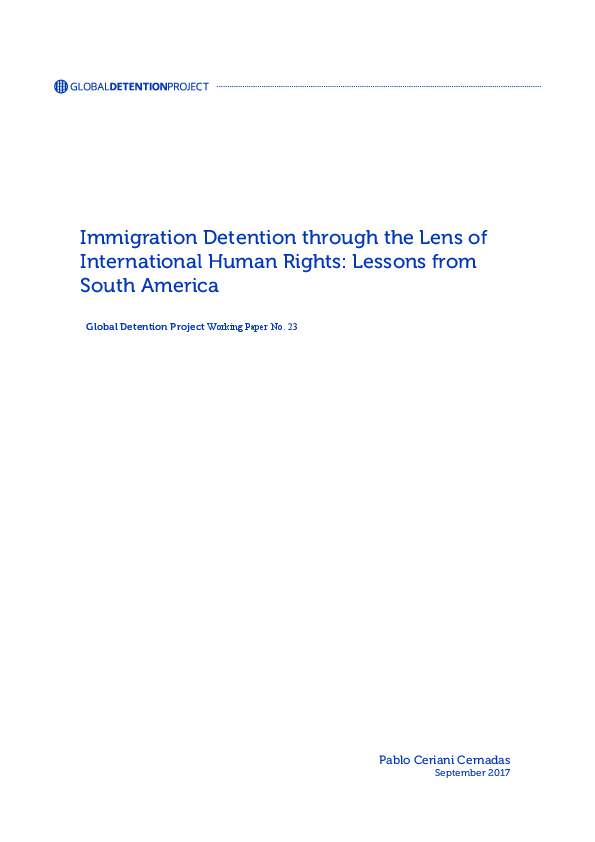Suriname, with an estimated population of approximately 590,000, is located on the northeastern Atlantic coast of South America and is the smallest country on the continent. The country faces a complex situation as a country of origin, transit, and destination for human trafficking and irregular migration. As of 22 March 2021, the country had recorded […]
Last updated:
DETENTION STATISTICS
Migration Detainee Entries
DETENTION CAPACITY
ALTERNATIVES TO DETENTION
ADDITIONAL ENFORCEMENT DATA
PRISON DATA
POPULATION DATA
LEGAL & REGULATORY FRAMEWORK
Does the Country Have Specific Laws that Provide for Migration-Related Detention?
GROUNDS FOR DETENTION
LENGTH OF DETENTION
DETENTION INSTITUTIONS
PROCEDURAL STANDARDS & SAFEGUARDS
COSTS & OUTSOURCING
COVID-19 DATA
TRANSPARENCY
MONITORING
NATIONAL HUMAN RIGHTS MONITORING BODIES
NATIONAL PREVENTIVE MECHANISMS (OPTIONAL PROTOCOL TO UN CONVENTION AGAINST TORTURE)
NON-GOVERNMENTAL ORGANISATIONS (NGOS)
GOVERNMENTAL MONITORING BODIES
INTERNATIONAL DETENTION MONITORING
INTERNATIONAL TREATIES & TREATY BODIES
International Treaties Ratified
Ratio of relevant international treaties ratified
Relevant Recommendations or Observations Issued by Treaty Bodies
33...The Committee also regrets the lack of information on measures to ensure that immigration detention is always a measure of last resort applied for the shortest possible period, that the maximum limit of 30 days provided for in article 28.2 of the Aliens Act is respected in practice or that detained migrants are provided with effective access to appeal their detention (arts. 7, 9, 12, and 13)...
c) Ensure that immigration detention is always a measure of last resort applied for the shortest possible period, that statutory limits to the duration of immigration detention are respected in practice and that detained migrants are
provided with effective access to appeal their detention.
(a)Allocate adequate human, technical and financial resources to the new government infrastructure to combat trafficking in persons (Schakelketting 2.0), in order to implement the national strategy and national plan of action to combat trafficking in persons, and establish a sufficient number of adequately equipped shelters for victims of trafficking in different parts of the State party;
(b) Investigate, prosecute and adequately punish perpetrators and ensure that victims of trafficking and prostitution are exempted from criminal liability and provided with adequate protection, remedies and reparations, including temporary residence permits, medical care, psychosocial counselling, rehabilitation and reintegration support and compensation;
(c) Adopt a policy to ensure that victims of trafficking in need of protection have access to asylum procedures in the State party and that gender-sensitive identification and referral mechanisms are in place at points of entry and in detention facilities;
(d) Continue to carry out capacity-building for judges, prosecutors, border police, immigration authorities and other law enforcement officers on early identification and gender-sensitive protocols for dealing with victims of trafficking.
> UN Special Procedures
> UN Universal Periodic Review
Relevant Recommendations or Observations from the UN Universal Periodic Review
REGIONAL HUMAN RIGHTS MECHANISMS
Regional Legal Instruments
HEALTH CARE PROVISION
HEALTH IMPACTS
COVID-19
Country Updates
Government Agencies
Ministry of foreign affairs - https://www.foreign.gov.kn/2906-2/suriname/
Immigration and Customs - https://icf.sr/
International Organisations
UNHCR - https://www.unhcr.org/where-we-work/countries/suriname
IOM - https://iom-nederland.nl/en/great-stories/voluntary-return/monitoring-visit-to-suriname
NGO & Research Institutions
Voluntary Suriname - https://www.volunteersuriname.com/
Bureau NGO - https://www.bureaungo.org/
Red Cross Society - https://www.ifrc.org/national-societies-directory/suriname-red-cross




